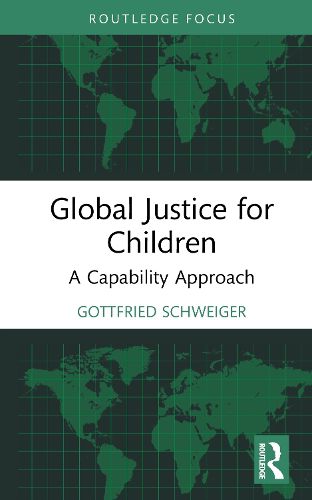Readings Newsletter
Become a Readings Member to make your shopping experience even easier.
Sign in or sign up for free!
You’re not far away from qualifying for FREE standard shipping within Australia
You’ve qualified for FREE standard shipping within Australia
The cart is loading…






While global justice is a hot topic in political philosophy, the place of children and children as a particular group of agents has been largely ignored. This book explores global justice for children from the perspective of the capability approach.
The capability approach provides a fruitful normative foundation for exploring the issue of global justice for children. To spell this out, it is necessary to address the questions of the currency of justice, its principles, and the allocation of responsibility, and to show that all children have a moral claim to the capabilities and functionings they require for a sufficiently good life. The first chapters are devoted to the status of children in political philosophy and to methodological considerations. The next chapters then argue that developing capabilities and functionings constitute the appropriate currency of global justice. The discussion then turns to the question of the principle of global justice, advocating a sufficiency principle that recognizes different thresholds in order to secure a sufficiently good life for all children. Finally, the concluding chapters address the question of responsibility for justice. Here, the book develops a theory of differentiated responsibility, which distributes responsibilities among various agents.
Global Justice for Children will be of interest to researchers and students working in social and political philosophy, ethics, philosophy of childhood and development studies.
$9.00 standard shipping within Australia
FREE standard shipping within Australia for orders over $100.00
Express & International shipping calculated at checkout
Stock availability can be subject to change without notice. We recommend calling the shop or contacting our online team to check availability of low stock items. Please see our Shopping Online page for more details.
While global justice is a hot topic in political philosophy, the place of children and children as a particular group of agents has been largely ignored. This book explores global justice for children from the perspective of the capability approach.
The capability approach provides a fruitful normative foundation for exploring the issue of global justice for children. To spell this out, it is necessary to address the questions of the currency of justice, its principles, and the allocation of responsibility, and to show that all children have a moral claim to the capabilities and functionings they require for a sufficiently good life. The first chapters are devoted to the status of children in political philosophy and to methodological considerations. The next chapters then argue that developing capabilities and functionings constitute the appropriate currency of global justice. The discussion then turns to the question of the principle of global justice, advocating a sufficiency principle that recognizes different thresholds in order to secure a sufficiently good life for all children. Finally, the concluding chapters address the question of responsibility for justice. Here, the book develops a theory of differentiated responsibility, which distributes responsibilities among various agents.
Global Justice for Children will be of interest to researchers and students working in social and political philosophy, ethics, philosophy of childhood and development studies.